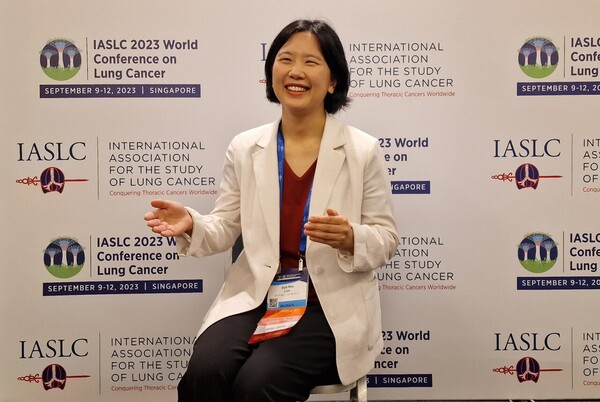SINGAPORE -- To enhance the competitiveness of new drug development, the Ministry of Food and Drug Safety (MFDS) needs to relax clinical trial regulations and create a standard of care reimbursement environment that meets global standards, an expert has suggested.

Professor Lim Sun-min of the Lung Cancer Center at Yonsei Cancer Hospital said so while sharing the current status of the development of fourth-generation EGFR TKIs at the World Conference on Lung Cancer 2023 in Singapore from Sept. 9-12.
Professor Lim attended WCLC 2023 to give an oral and poster presentation on the fourth-generation EGFR TKI candidates, BBT-176 and JIN-A02, under development by BridgeBio and J Ints Bio.
BBT-176 is a candidate evaluated to treat resistance variant C797S, typical of patients treated with third-generation EGFR TKIs. It is at the most advanced stage of development globally, with preclinical studies confirming efficacy against the triple mutation (exon 19 del/T790M/C797S or L858R/T790M/C797S) and now dosing for a phase 2 clinical trial.
According to the announcement, the phase 2 clinical trial will be conducted at a dose of 160 mg of BBT-176 taken orally twice daily.
Initially, the drug was being developed as a once-daily dose, but due to concerns about gastrointestinal side effects, the dose was lowered to twice daily to improve tolerability.
"The Maximum Tolerated Dose (MTD) of BBT-176 ranges from 320 to 480 mg daily, and we found that the 160 mg twice daily dose was much better tolerated and had fewer side effects," Professor Lim said.
The data presented also included molecular responses assessed by ctDNA. Using gadget liquid biopsies to look at the concentration of residual “C797S” in the blood before and after treatment, researchers confirmed that BBT-176 significantly reduced the amount of residual ctDNA in the blood while reducing tumor size.
JIN-A02 is also designed to target variants, including C797S. Preclinical data confirmed efficacy and patient enrollment has begun for a phase 1 dose-escalation trial (Part A), with three patients enrolled to date.
In her poster presentation, Professor Lim unveiled the upcoming JIN-A02 initial clinical trial design, which will be divided into cohorts to maximize the number of cases with different genetic variants.
"The patients who will be included in the study have received much previous treatment, so they have not just C797S but various other genetic variants," Lim said. “So, we have elaborately designed enrolling patients by doubly and triply counting the number of cases for each genetic variant they have."
However, Lim pointed out that restrictions remain because the clinical trial targets of the fourth-generation drugs developed in Korea differ from the global needs.
For example, Tagrisso (osimertinib), a third-generation EGFR TKI, is already used as a standard therapy for first-line treatment globally, and there is no need for T790M, which occurs after using first-generation drugs.
However, in Korea, where third-generation drugs are not covered, patients use first- or second-generation drugs for 1st-line treatment before using the third-generation drugs. So, the nation can’t help having many patients with triple mutations, those who have T790M and C797S in addition to existing EGFR mutations (exon 19 del or L858R), according to Professor Lim.
"In the end, even if a new drug for the triple mutation is developed in Korea, it is likely to have little need globally," she pointed out. "The gap in clinical practice eventually affects the direction of global drug development."
In addition, to meet the clinical trial conditions required by the Ministry of Food and Drug Safety, patients who have failed treatment with third-generation drugs and platinum-based chemotherapy, currently used as a standard of care, will participate in the trial, Lim noted. As previous treatments compromise the patient's condition, the response to treatment of fourth-generation candidates is relatively poor, she added.
The fourth-generation drugs developed globally reflect the needs of the clinical field by, for instance, proceeding directly to clinical trials in patients who have failed Tagrisso in first-line treatment or testing in combination with Tagrisso in first-line treatment. In Korea, however, they are forced to make inevitable choices to meet the standards for approval of clinical trials by the Ministry of Food and Drug Safety.
"We are missing out on the commercial value of clinical trial design by trying to meet the rigid standards required by the MFDS," Lim said.

